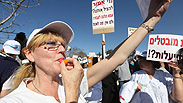
Mass strike at Hadassah hospital over cash crisis; Netanyahu: The public will pay
With hospital's debt swelling to NIS 1.3 billion and salaries unpaid, thousands of staff take open-ended industrial action
Prime Minister Benjamin Netanyahu on Monday blamed a "management failure" for the decision to strike by the thousands of staff at the Hadassah Medical Center's two Jerusalem hospitals, and warned that the public would pay for the massive debt that sparked the crisis.
The entire staff began an open-ended strike earlier Monday over salary cuts, halting all operations except emergency care. Hospitals across Israel on Sunday held a two-hour work stoppage in solidarity. A strike by the Hadassah doctors began last week.
The privately owned hospital, which treats nearly one million people a year at its two locations, has racked up massive debts of 1.3 billion shekels ($368 million), the hospital director said.
Related stories:
- Israeli doctors halt work in a show of solidarity with embattled Hadassah staff
- Nurses' strike ends with 'historic' deal
- Dozens stand to lose jobs as Bikur Holim closes
The hospital's 850 doctors began their strike last Tuesday, after only receiving half of their January salary. Less than a week later, they were joined by all of the staff at Hadassah Ein Kerem and Hadassah Mount Scopus, a labor union spokesman said.
On Monday, Jerusalem District Court heard the Hadassah management's petition for a stay of legal proceedings against the hospital. If the petition is approved, Hadassah will be protected from its creditors for three months. Outside the court, workers rallied against the management's request, as they fear that its approval will lead to a cancellation of their collective work agreements, and deprive them of their salaries.
The Israeli Medical Association, which represents the workers, told the court that the management's request is a case of underhanded opportunism: "We learned about the request for a stay of proceedings from the media," it said. "Its goal is to break up organized labor at Hadassah."
Speaking at a Likud faction meeting, Netanyahu said that the burden of ending the crisis would fall on the state.
"We recognize the importance of Hadassah. Both my sons were born there," he said. "Regarding the issue itself – there was a major malfunction. When the government is in deficit, we take care of it immediately. A deficit accumulated there, in an unclear way, perhaps because of the assumption that there would be someone who would pay."
Netanyahu added: "The matter should be dealt with thoroughly, and those who need to deal with it are the designated ministries – the Ministry of Health and Ministry of Finance. The public will end up paying, and there should be guarantees that the deficit will not reemerge."
The prime minister, while preferring to pass the responsibility on to the ministries, did not mention that he had been health minister of health for four consecutive years, only ceding the post last March.
Meanwhile, as a parliamentary committee met to discuss the crisis, around 1,000 hospital employees gathered outside the Knesset to demonstrate, union officials said.
"Working like ants - where is the money?" read one of the signs held up by protesters.
"Hospital closed - please contact the government," said another, while a third banner read: "There are people behind the numbers."
Hadassah employs over 850 doctors, 1,940 nurses, 1,020 paramedical and support staff, and nearly 900 managers who work across two campuses. The two facilities have a total of 1,150 beds, 31 operating rooms, and nine specially-oriented intensive care units, the hospital's website says.
Hadassah's management filed for a stay of proceedings at Jerusalem District Court on Thursday to obtain court protection for implementing its recovery plan, said a spokeswoman for the Israeli Medical Association, which represents the striking doctors.
The hospital, which is owned and funded by the Hadassah Women's Zionist Organisation of America, has annual expenditures of 2 billion shekels, which exceed its income by 300 million shekels, resulting in an accumulated debt of 1.3 billion shekels, financial newspaper Globes said.
Part of the deficit is due to the large discounts awarded to Israeli healthcare funds, the construction of a new hospital tower at Hadassah Ein Kerem, and the huge salaries paid to doctors under private practises, it added.
Yaron Kelner and Moran Azulay contributed to this report.










